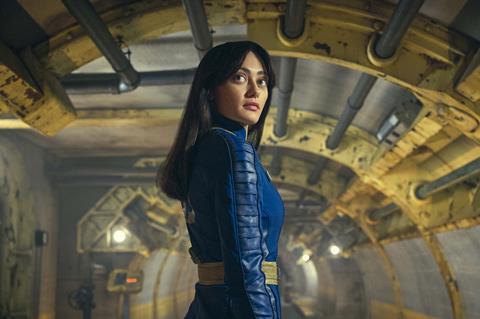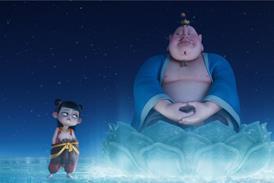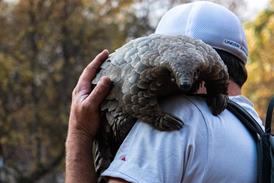
The year is 2077, on an alternative future Earth. Following advancements of post-Second World War nuclear technology and the emergence of a retro futuristic society, a battle for resources culminates in catastrophic war. A few lucky survivors make it to the safety of underground bunkers known as Vaults, where they live in relative harmony for the next 200 years — or, at least, that is what the residents of Vault 33 believe. When, in 2296, a shocking event forces 20-something Vault-dweller Lucy (Ella Purnell) into the ravaged wastelands of California, what she finds will rip the scales unceremoniously from her eyes.
The premise of Prime Video’s hit show, which is adapted from the videogame franchise first launched in 1997, is certainly high concept, and viewers have been responding in their droves. The eight-episode series, which is produced by Amazon MGM Studios along with Jonathan Nolan (who directs the first three episodes) and Lisa Joy of Kilter Films and Bethesda Game Studios, had 65 million views in the two weeks from its debut on April 10, and was quickly renewed for a second season.
London-born Purnell, who was cast in 2022 after impressing in films including Maleficent and Miss Peregrine’s Home For Peculiar Children and small-screen shows including Showtime’s Yellowjackets, knew there would be an in-built viewership because of the game’s popularity. But, she says, she has been blown away by its success.
“It’s incredibly difficult making an adaptation of a game, because you’re changing the format,” says Purnell, who played Fallout as part of her character research. “You’re taking away the thing people love about games, which is the first-person choices, the control over the character. I think [showrunners and writers Geneva Robertson-Dworet and Graham Wagner] have done that in a smart, almost philosophical way.
“We have these three archetypes from the game — Lucy, The Ghoul [one of a post-human race mutated by radiation] and the Brotherhood of Steel [a quasi-religious technocratic military order],” she continues. “They are three morally different characters with different wasteland experiences. And it manages to be funny, but also heartfelt and deep.”
Age of innocence
Purnell, who was named a Screen International Star of Tomorrow in 2010, was immediately taken with Lucy: “I loved her optimism and how funny she was.” Purnell describes the character as a “newbie” to the wasteland when she emerges from the hermetically sealed safety of Vault 33 on a daring mission to rescue her kidnapped father (Kyle MacLachlan). “But she’s not stupid,” asserts the actress. “Innocence doesn’t mean stupidity. You can still be naive and innocent but strong and courageous; all these things can exist within the same person. Quite often we don’t see those multidimensional characters, especially with young women.
“I never wanted one particular thing to push her too far in one direction,” she continues. “I didn’t want to just put her in a box. She is positive and happy, but can handle herself. She knows how to handle a gun, how to fight. You are constantly being surprised by her.”
And it is not long before Lucy has to make some difficult decisions, particularly after meeting The Ghoul (played, under heavy prosthetics, by Walton Goggins, who Purnell describes as a “master of his craft”), a seemingly immortal yet grotesquely mutated human, kept alive by regular drug shots. His backstory — before the bomb, he was successful Hollywood star Cooper Howard, whose wife worked for the shadowy Vault-Tec — proves central to the show. The Ghoul seems to have lost all traces of his humanity yet, as we come to understand, his narrative arc is similar to Lucy’s.
“[Walton and I] were doing an interview, and he said that Lucy is going through the same realisations about her father that Cooper went through with his wife, and these themes mirror each other,” recalls Purnell. “It was a huge realisation for me. When you’re filming it, you’re not thinking about how they’re going to cut it together.”
Another challenge, says Purnell, was being pushed out of her comfort zone by the show’s intense physical demands. “I was pretty nervous about doing all of [the stunt work] at the beginning,” she laughs. “The scene in which The Ghoul uses Lucy as bait [to capture a giant mutant aquatic creature], for example, I was thinking it would all be green screen. No, that was really me, being lowered into the water in upstate New York with my hands tied, missing a shoe. By the end, I absolutely loved it. It was the hardest job I’ve ever done, but it was also the most rewarding.”
After all the physical challenges, the devastating season finale — in which Lucy must confront traumatic realisations about her father and her past — posed a psychological conundrum. “We tried the ending so many different ways,” Purnell recalls. “We had a lot of conversations about what this would look like for Lucy. [But] all the versions we tried, the crying and the wailing and screaming, felt redundant and inauthentic. The thing Lucy stands for is hope, optimism, morality, and so I thought about what happens when that kind of person loses all hope. That didn’t come out of a conversation, that came out of one take where I just did nothing. And it felt right. I think it’s so moving because we’ve never seen Lucy that way before. Just empty.”
Lucy, however, is a survivor, and walks into season two at The Ghoul’s side, both on the hunt for answers. “I’m excited to see what the writers are going to do next,” says Purnell of season two, which is reportedly due to start shooting in September. “Because Lucy is almost now a blank slate. I would like to see her have opinions born of experience, not just as a product of her upbringing.”
In the days following Screen International’s chat with Purnell, it was announced she had signed on to Craig Roberts’ horror comedy The Scurry, playing a park attendant defending herself against killer rodents. It joins a line of projects about women in survival mode — Yellowjackets, Fallout, Army Of The Dead— to which Purnell seems drawn.
“From a psychological aspect, I’m exploring what we are capable of at the very limits of human nature,” she observes. “It feels like this dirty secret, that women can by messy and aggressive, violent and angry. It’s exciting to play characters that get to lose their inhibition and let a bit of their animal side out.”
The nominations-round voting period for the 76th Primetime Emmy Awards is open from June 13-24.

























1 Readers' comment